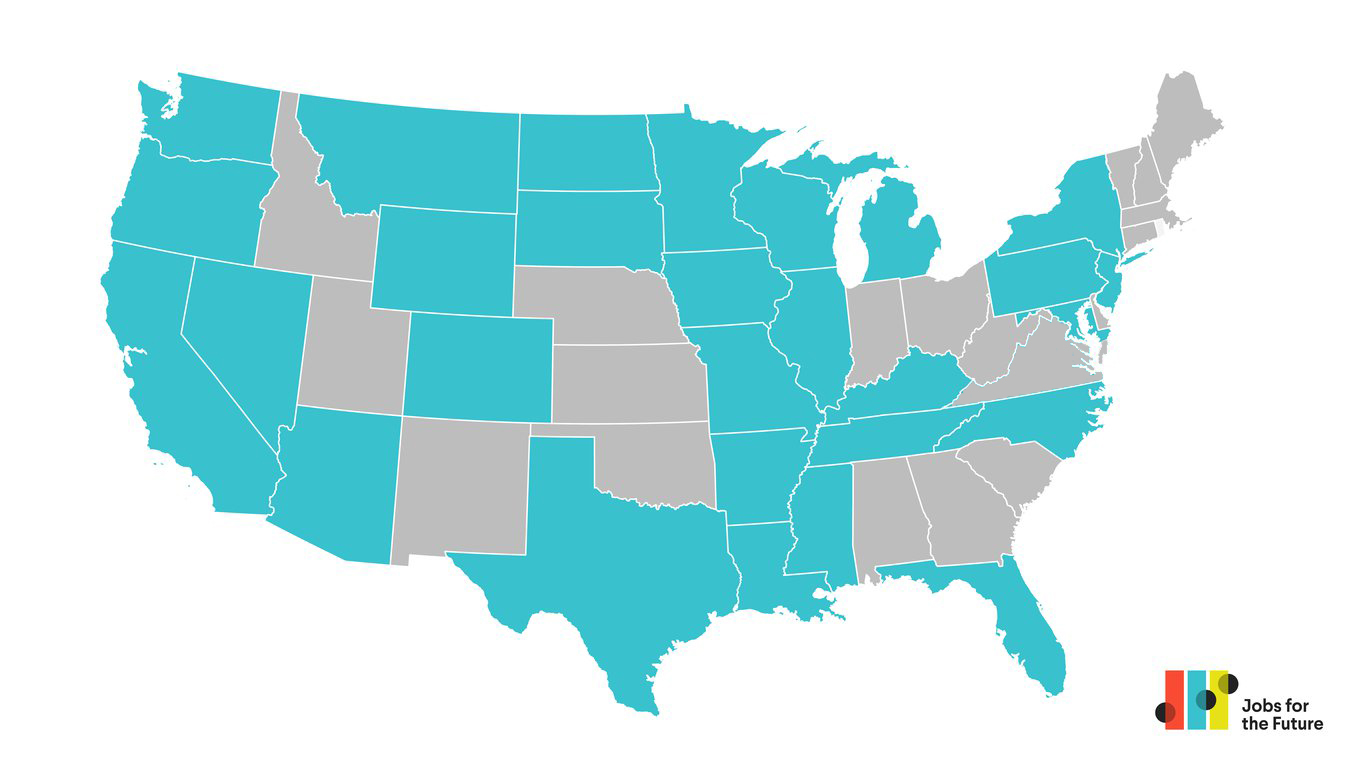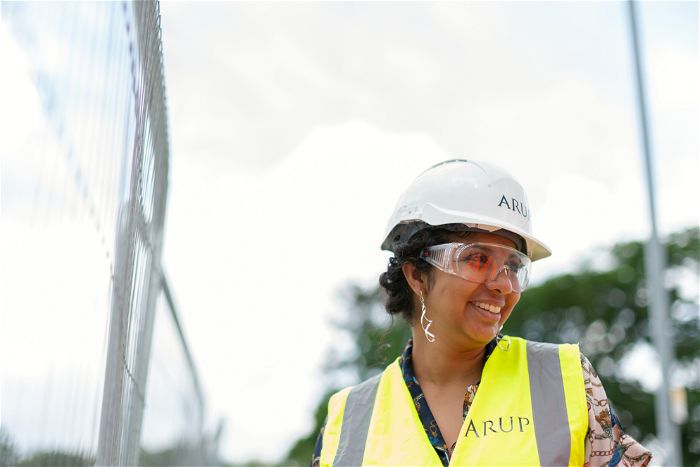A Highly Diverse Cohort of Regional Climate and Workforce Leaders
When selecting Challenge Members to engage in the learning phase, we prioritized geographical, industry, and population diversity.
- 55% of Challenge Members primarily serve rural and/or Indigenous communities.
- 35% prioritize quality green job training and placement for young people who are not working or in school.
- 85% focus on quality green job training and placement for communities that have not previously received equitable green job training.
- 20% are designing training and placement programs for people who have been incarcerated.
- All the Challenge Members described regionally responsive innovative solutions to address challenges at the intersection of climate and workforce development.
Individually, these regions will lead the implementation of innovative, adaptive solutions that respond to local needs, constraints, and opportunities. Collectively, the cohort is positioned to recognize, share, and scale effective strategies to shape the growing green economy. Ultimately, five Challenge Winners will be selected from among the 20 original Challenge Members and receive additional funding to train and place 25,000 individuals in quality green jobs, transforming their regional economies and leading the clean energy transition nationally.
Meet the Challenge Members
1. Arizona State University | Arizona
This university-led statewide effort will lean into Arizona’s most abundant natural resource—sunshine—to prepare workers for jobs in solar energy. It will also provide training for jobs in the electric vehicle industry.
2. BlocPower and JobTrain | Menlo Park, California
This nonprofit-led initiative will scale an established approach to quality green job expansion in support of Menlo Park’s goal to be carbon neutral by 2030.
3. Inland Empire Labor Institute/Plug In IE | Inland Empire, California
This effort will electrify the booming logistics industry to reduce air pollution and carbon emissions and meet the demands of a population expected to increase 20% by 2048.
4. Lyra Colorado | Rural Western Colorado
Lyra will build a talent pipeline for quality green jobs for youth in rural Western Colorado, emphasizing work-based learning and career and technical education pathways.
5. CareerSource North Central Florida | North Central Florida
CareerSource will advance the work of Alachua County’s community-led Project EMPOWER—Energy Modernization for People, Opportunity, Work, Equity, and Renewables—by building a talent pipeline for quality green jobs for underserved communities in North Central Florida.
6. Greater New Orleans Foundation | Southeast Louisiana
The foundation will lead the expansion of industry sector partnerships from the City of New Orleans to the Greater New Orleans region to tackle an array of climate concerns that have intensified since Hurricane Katrina made landfall in 2005.
7. Center for Energy Workforce Development (CEWD) | Michigan, Minnesota, and the District of Columbia
CEWD will partner with the National Urban League to lead a coordinated multistate initiative to expand opportunities for all in the growing energy industry.
8. Mississippi River Cities & Towns Initiative | Mississippi River Corridor
An association of 103 U.S. mayors will train public administrators across 10 states that already have some foundational climate-resilience capacities.
9. Nevada Clean Energy Fund (NCEF) | Nevada
NCEF will partner with key state offices to provide financial and technical assistance to 5,000 Nevadan workers to support an affordable and accessible clean energy economy.
10. Interstate Renewable Energy Council (IREC) | Northern Plains
IREC will partner with the Northern Cheyenne Nation and tribal workforce systems and colleges to design and implement training in the clean energy sector.
11. Newark Workforce Development Board (NWDB) | Newark, New Jersey
NWDB will partner with BlocPower to expand its Civilian Climate Corps, targeting individuals currently underrepresented in green jobs, including women, Black and Brown residents, and justice-impacted individuals.
12. Binghamton University | Southern Tier of New York
Binghamton University, part of the State University of New York higher education system, will lead the 16-member New Energy New York coalition, spanning the private and public sectors, to build out a battery and energy storage hub in the region.
13. The Industrial Commons | Western North Carolina
A leader in the U.S. textile circular economy, The Industrial Commons will use its funding to scale and accelerate its vocational training programs, industry partnerships, and education provider partnerships nationally.
14. Portland General Electric, on behalf of the Oregon Clean Energy Workforce Coalition (OCEWC) | State of Oregon
OCEWC is a group of more than 60 organizations—including major employers, training providers, and local governments—that will launch a pilot program to build energy-sector career awareness and job training and placement opportunities for underserved populations within the construction, energy efficiency, and energy infrastructure fields.
15. Hopeworks | Philadelphia Metropolitan Area
Hopeworks, which takes a trauma-informed approach to its work, will expand technical training and paid work experiences for opportunity youth in high-demand, high-wage green jobs.
16. Sustainable Pittsburgh (PGH) | Southwestern Pennsylvania
With a focus on construction and clean energy jobs, Sustainable Pittsburgh will work with Partner4Work and other partners to expand a coordinated public-private effort to scale existing training programs, supportive services, and employer partnerships, building a strong region-wide ecosystem of equitable job growth.
17. Green Careers Dallas | Texas
With a focus on communities that are food and employment deserts, Green Careers Dallas will expand its existing solar training program to include an earn-and-learn education model and develop an apprenticeship program with the U.S. Department of Labor.
18. Utah State University (USU) | Utah
With campuses in every county in Utah, USU will integrate sustainability and climate action into existing curricula and will implement vocational training programs at each of its campuses, with a focus on the trades.
19. University of Tennessee | Tennessee
The University of Tennessee has partnered with 17 local industries and 43 non-industry partners to drive economic development via green jobs, focusing on quality green jobs that require vocational training as opposed to a four-year degree.
20. Washington State Board for Community and Technical Colleges (SBCTC) | Washington
The SBCTC will partner with Washington State Centers of Excellence to develop a statewide green economy certificate program to enhance existing two-year trade programs.
Through CREST, JFF is honored to support and champion the Challenge Members and looks forward to disseminating the lessons they uncover to the broader field. Please stay in touch and follow along as we continue to discover regional quality green job strategies that drive equitable economic advancement for all.




